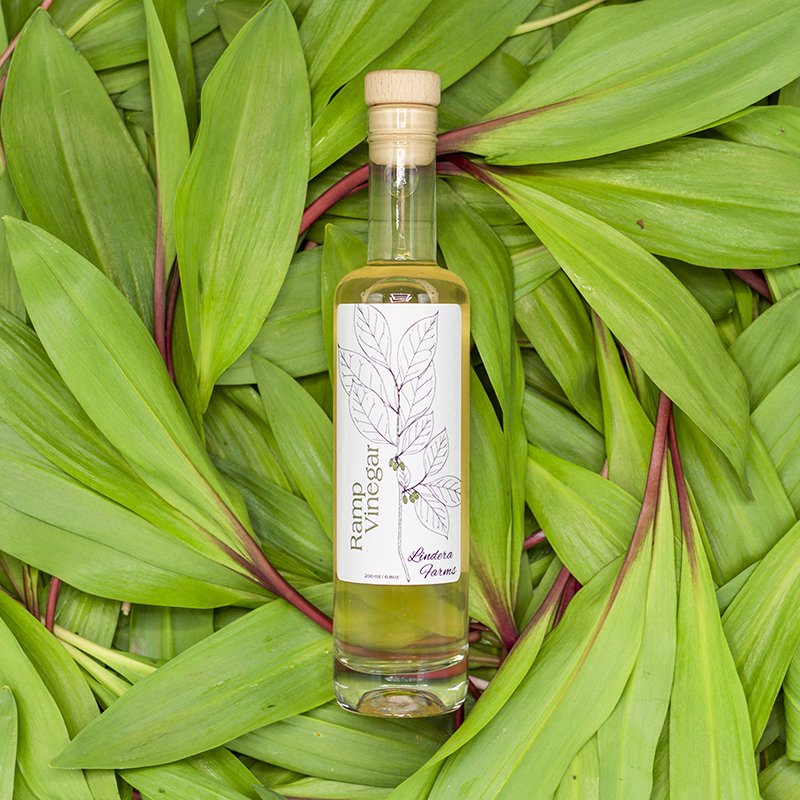Fruit & Vegetable "Scrap" Vinegar
Lindera Farms ramp vinegar
Mid-Atlantic Vinegar Makers Bottle Bumper Crops
In a waste not, want not food world, home cooks and restaurant chefs alike are upcycling food scraps in creative ways. Certainly, composting is a superb way to keep food out of landfills, but vinegar is another extraordinary means of extending a piece of produce’s life. Making vinegars from burst or bruised fruits and vegetables is nearly analogous to infusing vinegars with apple cores, carrots peels and onion skins. But during the bumper crop quarter of any four season state, capturing the essence of seasonal fruit and vegetables as a vinegar, is as perfunctory as any preservation method, even pickling!
Keepwell Vinegar’s Sarah Conezio Isaiah Billington
Small-batch artisanal vinegar from scraps
Mid-Atlantic vinegar maker, Keepwell Vinegar, has grown its catalog from its sweet culinary origins. Sarah Conezio and Isaiah Billington worked as pastry chefs in the Chesapeake area before they started pushing sugar in a different direction. And thus, their small-batch artisanal vinegar company was born. “It’s impossible not to grapple with the casual level of food waste that a farmer just has to accept; you see the glut of perfect heirlooms in the compost pile in late summer when everyone’s harvest is peaking simultaneously,” reflect Billington, “the cook’s brain cries out for utilization.”
The two started their company in an accelerator space in Washington, DC, in 2015, and saw so much local business support for what they were doing, that they left their kitchen jobs to pursue Keepwell completely.
One of Keepwell’s prime ingredients is Penncrisp celery from Green Meadow Farm in Virginia — a plant that’s usually set aside on an entire floor in their bank barn for blanching it for winter use, and rarely makes its way to market. After the first frost or two, the sugar content in the stalks shoots up, with a high enough Brix (sugar content) that they can be converted into vinegar. Same goes for Three Springs Fruit Farm’s York Imperial apples, “mainly because they look funny, and aren’t the round red ideal of an apple,” says Billington. Keepwell’s cider vinegar is aged in barrel until a deep honeyed sweet aroma emerges.
Keepwell Vinegar bottles
Keepwell also bolsters the fragrant nose of bitter lemons from Next Step Produce, a local mid-Atlantic citrus, whose raw fruit is rough — or as Billington divulges, “too green, too piney and too pithy to use, but because of long and slow fermentation, it smooths out, leaving a more pleasant bitterness, like many aperitifs,” … saving the season in a bottle, of vinegar.
A contemporary regional fermenter, Daniel Liberson, founder of Lindera Farms, began brewing his idea for a vinegar company when working for Chef John Shields at Townhouse in Chilhowie, VA, in 2011. “The first experiments used foraged flowers that we had leftover after a night’s service,” says Liberson, who utilized the likes of elderflowers, mulberries, wild chamomile and spicebush. Now, this bouquet of Mid-Atlantic flavors has become signature to Lindera Farm’s shelf-stable pantry.
Lindera Farms’ Daniel Liberson
Flipping the scrip on scraps
While “scraps” is subjective, much of Lindera Farm’s ingredients are foraged within Liberson’s family’s 225-acre nature preserve in Delaplane VA. Vinegars are brewing within fresh ingredients that are barely an hour out of being picked “so there’s zero degradation in terms of quality,” affirms Liberson, who also works with other small farms in the area, but rather than using up seconds like many vinegar producers do, Lindera is only looking for top-tier products.
Rather than collecting outcast pieces of produce, Liberson flips the script. His vinegar-making method is traditionally transposed as well, as somewhat of an “inversion of the Orléans method; rather than incorporating new wine into old vinegar, where the older vinegar makes up the overwhelming majority of the batch, we incorporate old vinegar to innoculate new the new ferments we brew each year.” This keeps flavors fresher and brighter.
In the last decade or so, Liberson has made over 100 different varieties of vinegar, including more traditional apple cider vinegars, as well as wine vinegars made from native grapes — but the chef in him allows for more bespoke renditions, like a ramp vinegar that “tastes like drunk nachos,” Liberson quips as part of his sales pitch, or Lindera’s atypical farm-origin products, such as caramelized onion vinegar, or heirloom fish pepper vinegar, which tastes like a straightforward superlative hot sauce.
There are a number of other nearby vinegar makers, like Native Vinegar, who are proliferating the practice of bespoke small batch bottles. Proprietor Bert Mooney IV, spontaneously ferments products of Pennsylvania, foraging fallen black walnuts and sappy spruce tips. While in Brooklyn, NY, Chris Crawford of Tart Vinegar looks forward to the short but stellar sour cherry harvest and brief breezy fields of lavender — both which find their way into her vinegars. Whatever your bounty, consider capturing the season with acidity.





